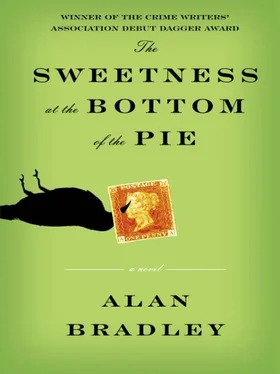Alan Bradley - The Sweetness at the Bottom of the Pie
Здесь есть возможность читать онлайн «Alan Bradley - The Sweetness at the Bottom of the Pie» весь текст электронной книги совершенно бесплатно (целиком полную версию без сокращений). В некоторых случаях можно слушать аудио, скачать через торрент в формате fb2 и присутствует краткое содержание. Жанр: Старинная литература, на английском языке. Описание произведения, (предисловие) а так же отзывы посетителей доступны на портале библиотеки ЛибКат.
- Название:The Sweetness at the Bottom of the Pie
- Автор:
- Жанр:
- Год:неизвестен
- ISBN:нет данных
- Рейтинг книги:3 / 5. Голосов: 1
-
Избранное:Добавить в избранное
- Отзывы:
-
Ваша оценка:
- 60
- 1
- 2
- 3
- 4
- 5
The Sweetness at the Bottom of the Pie: краткое содержание, описание и аннотация
Предлагаем к чтению аннотацию, описание, краткое содержание или предисловие (зависит от того, что написал сам автор книги «The Sweetness at the Bottom of the Pie»). Если вы не нашли необходимую информацию о книге — напишите в комментариях, мы постараемся отыскать её.
The Sweetness at the Bottom of the Pie — читать онлайн бесплатно полную книгу (весь текст) целиком
Ниже представлен текст книги, разбитый по страницам. Система сохранения места последней прочитанной страницы, позволяет с удобством читать онлайн бесплатно книгу «The Sweetness at the Bottom of the Pie», без необходимости каждый раз заново искать на чём Вы остановились. Поставьте закладку, и сможете в любой момент перейти на страницу, на которой закончили чтение.
Интервал:
Закладка:
These were questions I could not ask him outright. I thought I'd try a different tack.
"Of course I'll keep quiet," I said. "But why?"
Dogger picked up a trowel and began shoveling black soil into a pot. He did not look at me, but his jaw was set at an angle that signaled clearly that he had made up his mind about something.
"There are things," he said at last, "which need to be known. And there are other things which need not to be known."
"Such as?" I ventured.
The lines of his face softened and he almost smiled.
"Buzz off," he said.
IN MY LABORATORY, I pulled the paper-wrapped packet from my pocket and carefully opened out the folds.
I gave a groan of disappointment: My cycling and wall climbing had reduced the evidence to little more than particles of pastry.
"Oh, crumbs," I said, not without a little pleasure in the aptness of my words. "Now what am I going to do?"
I put the feather carefully into an envelope, and slipped it into a drawer among letters belonging to Tar de Luce that had been written and replied to when Harriet was my age. No one would ever think of looking there, and besides, as Daffy once said, the best place to hide a glum countenance is onstage at the opera.
Even in its mutilated form, the broken pastry reminded me that I had not eaten all day. Supper at Buckshaw was, by some archaic statute, always prepared earlier by Mrs. Mullet and warmed over for our consumption at nine o'clock.
I was starved, hungry enough to eat a… well, to eat a slice of Mrs. Mullet's icky custard pie. Odd, wasn't it? She had asked me earlier, just after Father fainted, if I had enjoyed the pie… and I hadn't eaten any.
When I had gone through the kitchen at four in the morning—just before I stumbled upon that body in the cucumber vines—the pie had still been on the windowsill where Mrs. Mullet had left it to cool. And there had been a piece missing.
A piece missing indeed!
Who could have taken it? I remembered wondering about that at the time. It hadn't been Father or Daffy or Feely; they would rather eat creamed worms on toast than Mrs. Mullet's cussed custard.
Nor would Dogger have eaten it; he wasn't the sort of man who helped himself to dessert. And if Mrs. Mullet had given him the slice, she wouldn't have thought I ate it, would she?
I walked downstairs and into the kitchen. The pie was gone.
The window sash was still in its raised position, just as Mrs. Mullet had left it. Had she taken the remains of the pie home to her husband, Alf?
I could telephone and ask her, I thought, but then I remembered Father's telephonic restrictions.
Father was of a generation that despised “the instrument,” as he called it. Always ill at ease with the thing, he could be coaxed to talk into it only in the most dire circumstances.
Ophelia once told me that even when news had come of Harriet's death, it had to be sent by telegram because Father refused to believe anything he hadn't seen in print. The telephone at Buckshaw was subscribed to for use only in the event of fire or medical emergency. Any other use of “the instrument” required Father's personal permission, a rule which had been drummed into us from the day we climbed out of our cribs.
No, I would have to wait until tomorrow to ask Mrs. Mullet about the pie.
I took a loaf of bread from the pantry and cut a thick slice. I buttered it, then slathered on a blanket of brown sugar. I folded the bread twice in half, each time pressing it down flat with the palm of my hand. I stuck it in the warming oven and left it there for as long as it took me to sing three verses of “If I Knew You Were Comin' I'd've Baked a Cake.”
It was not a true Chelsea bun, but it would have to do.
10
EVEN THOUGH WE DE LUCES HAD BEEN ROMAN Catholics since chariot races were all the rage, that did not keep us from attending St. Tancred's, Bishop's Lacey's only church and a fortress of the Church of England if ever there was one.
There were several reasons for our patronage. The first was its handy location, and another the fact that Father and the Vicar had both (although at different times) been to school at Greyminster. Besides, Father had once pointed out to us, consecration was permanent, like a tattoo. St. Tancred's, he said, had been a Roman Catholic Church before the Reformation and, in his eyes, remained one.
Consequently, every Sunday morning without exception we straggled across the fields like ducks, Father slashing intermittently at the vegetation with his Malacca walking stick, Feely, Daffy, and me in that order, and Dogger, in his Sunday best, bringing up the rear.
No one at St. Tancred's paid us the slightest attention. Some years before, there had been a minor outbreak of grumbling from the Anglicans, but all had been settled without blood or bruises by a well-timed contribution to the Organ Restoration Fund.
"Tell them we may not be praying with them,” Father told the Vicar, “but we are at least not actively praying against them.”
Once, when Feely lost her head and bolted for the Communion rail, Father refused to speak to her until the following Sunday. Ever since that day, whenever she so much as shifted her feet in church, Father would mutter, “Steady on, old girl.” He did not need to catch her eye; his profile, which was that of the standard-bearer in some particularly ascetic Roman legion, was enough to keep us in our places. At least in public.
Now, glancing over at Feely as she knelt with her eyes closed, her fingertips touching and pointed to Heaven, and her lips shaping soft words of devotion, I had to pinch myself to keep in mind that I was sitting next to the Devil's Hairball.
The congregation at St. Tancred's had soon become accustomed to our ducking and bobbing, and we basked in Christian charity—except for the time that Daffy told the organist, Mr. Denning, that Harriet had instilled in all of us her firm belief that the story of the Flood in Genesis was derived from the racial memory of the cat family, with particular reference to the drowning of kittens.
That had caused a bit of a stir, but Father had put things right by making a handsome donation to the Roof Repair Fund, a sum he deducted from Daffy's allowance.
"Since I don't have an allowance anyway," Daffy said, "no one's the loser. It's a jolly good punishment, actually."
I listened, unmoved, as the congregation joined in the General Confession:
"We have left undone those things which we ought to have done; And we have done those things which we ought not to have done."
Dogger's words flashed into my mind:
"There are things which need to be known. And there are other things which need not to be known."
I turned round and looked at him. His eyes were closed and his lips were moving. And so, I noticed, were Father's.
Because it was Trinity Sunday we were treated to a rare old romp from Revelation all about the sardine stone, the rainbow round about the throne, the sea of glass like unto crystal, and the four beasts full of eyes before and uncomfortably behind.
I had my own opinion about the true meaning of this obviously alchemical reference, but, since I was saving it for my Ph.D. thesis, I kept it to myself. And even though we de Luces were players on the opposing team, as it were, I couldn't help envying those Anglicans the glories of their Book of Common Prayer.
The glass, too, was glorious. Above the altar, morning sunlight washed in through three windows whose stained glass had been poured in the Middle Ages by half-civilized semivagrant glassmakers who lived and caroused on the verge of Ovenhouse Wood, the thin remains of which still bordered Buckshaw to the west.
On the left panel, Jonah sprang from the mouth of the great fish, looking back over his shoulder at the thing with a look of wide-eyed indignation. From the booklet that used to be given away in the church porch, I remembered that the creature's white scales had been achieved by firing the glass with tin, while Jonah's skin had been made brown with salts of ferric iron (which, interestingly enough—to me at least—is also the antidote for arsenical poisoning).
Читать дальшеИнтервал:
Закладка:
Похожие книги на «The Sweetness at the Bottom of the Pie»
Представляем Вашему вниманию похожие книги на «The Sweetness at the Bottom of the Pie» списком для выбора. Мы отобрали схожую по названию и смыслу литературу в надежде предоставить читателям больше вариантов отыскать новые, интересные, ещё непрочитанные произведения.
Обсуждение, отзывы о книге «The Sweetness at the Bottom of the Pie» и просто собственные мнения читателей. Оставьте ваши комментарии, напишите, что Вы думаете о произведении, его смысле или главных героях. Укажите что конкретно понравилось, а что нет, и почему Вы так считаете.












